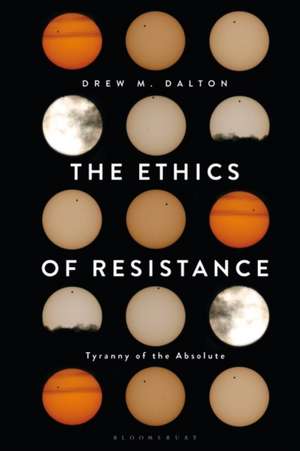The Ethics of Resistance: Tyranny of the Absolute
Autor Drew M. Daltonen Limba Engleză Paperback – 19 feb 2020
| Toate formatele și edițiile | Preț | Express |
|---|---|---|
| Paperback (1) | 222.19 lei 6-8 săpt. | |
| Bloomsbury Publishing – 19 feb 2020 | 222.19 lei 6-8 săpt. | |
| Hardback (1) | 713.38 lei 6-8 săpt. | |
| Bloomsbury Publishing – 22 aug 2018 | 713.38 lei 6-8 săpt. |
Preț: 222.19 lei
Preț vechi: 287.54 lei
-23% Nou
Puncte Express: 333
Preț estimativ în valută:
42.52€ • 43.93$ • 35.39£
42.52€ • 43.93$ • 35.39£
Carte tipărită la comandă
Livrare economică 25 martie-08 aprilie
Preluare comenzi: 021 569.72.76
Specificații
ISBN-13: 9781350152540
ISBN-10: 1350152544
Pagini: 224
Dimensiuni: 156 x 234 x 13 mm
Greutate: 0.25 kg
Editura: Bloomsbury Publishing
Colecția Bloomsbury Academic
Locul publicării:London, United Kingdom
ISBN-10: 1350152544
Pagini: 224
Dimensiuni: 156 x 234 x 13 mm
Greutate: 0.25 kg
Editura: Bloomsbury Publishing
Colecția Bloomsbury Academic
Locul publicării:London, United Kingdom
Caracteristici
Challenges and upends ethical judgements in post-Kantian philosophy, suggesting that European ideas of an absolute moral good lead precisely to the evils of colonialism and its various violences
Notă biografică
Drew M. Dalton is Associate Professor of Philosophy at Dominican University, USA.
Cuprins
INTRODUCTION: Sympathy for the Devil: On the Ethics of AcquiescencePART ONE: THE TYRANNY OF HEAVENCHAPTER 1: The Trouble with Post-Kantian Ethical Philosophy: Alan Badiou and Quentin Meillassoux on the Vicissitudes of Ethical AbsolutesCHAPTER 2: Phenomenology, Ethics, and the Other: Rediscovering the Possibility of an Ethical Absolute with Husserl, Heidegger, and LevinasCHAPTER 3: Problems with the Other: Levinas and Schelling on the Weight of the Infinite and the Reversibility of Ethical DemandINTERLUDE: The Tyranny of Heaven: On the Necessity of an Ethics of ResistancePART TWO: TOWARDS AN ETHICS OF RESISTANCECHAPTER 4: Don't Give up, Don't Give in! Jacques Lacan and Ethics of PsychoanalysisCHAPTER 5: Carving a Space of Freedom: Michel Foucault on the Ethical Power of ResistanceCONCLUSION: The Ethics of Demonic ResistanceBibliographyIndex
Recenzii
Drew Dalton's The Ethics of Resistance: Tyranny of the Absolute is a book that I wish I had written. This text is a rigorous, articulate, and exceptionally clear development of a unique and original ethical position . I highly recommend The Ethics of Resistance to both novices and scholars interested in ethics, phenomenology, and contemporary French philosophy. It presents a genuinely original philosophical position through rigorous, clear, and meticulous analyses, that, I think, must be reckoned with.
A valuable resource for students of religion as well as philosophy. Summing Up: Recommended. Upper-division undergraduates through faculty.
Through a sharp reading of the ethics foregrounding most contemporary western thought and philosophy's relationship with the absolute, Dalton finds the point where ethical thought falls into nihilism or, even worse, outright fascism. Dalton goes on to outline an "ethics of resistance" that pulls away from the tyranny of the absolute.
If anybody considers themselves to be on the cutting edge of contemporary ethics, then they cannot ignore Dalton's re-evaluation of what we thought we all knew about ethics.
Dalton does a great job of writing clearly about very difficult philosophers. This is an important book for anyone interested in the source of fanaticism.
A radical re-reading of evil in relation to ethics, which carries with it a powerful argument against the seduction of the absolute; the writing style is forceful and animated without being hyperbolic. This is an original contribution to the field of contemporary continental philosophy.
A valuable resource for students of religion as well as philosophy. Summing Up: Recommended. Upper-division undergraduates through faculty.
Through a sharp reading of the ethics foregrounding most contemporary western thought and philosophy's relationship with the absolute, Dalton finds the point where ethical thought falls into nihilism or, even worse, outright fascism. Dalton goes on to outline an "ethics of resistance" that pulls away from the tyranny of the absolute.
If anybody considers themselves to be on the cutting edge of contemporary ethics, then they cannot ignore Dalton's re-evaluation of what we thought we all knew about ethics.
Dalton does a great job of writing clearly about very difficult philosophers. This is an important book for anyone interested in the source of fanaticism.
A radical re-reading of evil in relation to ethics, which carries with it a powerful argument against the seduction of the absolute; the writing style is forceful and animated without being hyperbolic. This is an original contribution to the field of contemporary continental philosophy.
